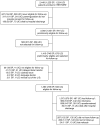Long-Term Outcomes after Protocolized Sedation versus Usual Care in Ventilated Pediatric Patients
- PMID: 29313710
- PMCID: PMC6005554
- DOI: 10.1164/rccm.201708-1768OC
Long-Term Outcomes after Protocolized Sedation versus Usual Care in Ventilated Pediatric Patients
Abstract
Rationale: Whether a nurse-implemented goal-directed sedation protocol resulting in more awake yet calm intubated children affects postdischarge functional status, health-related quality of life, or risk for post-traumatic stress disorder is unknown.
Objectives: To compare postdischarge outcomes in children with acute respiratory failure cluster-randomized to a sedation protocol or usual care.
Methods: A stratified random sample of 1,360 patients from 31 centers in the RESTORE (Randomized Evaluation of Sedation Titration for Respiratory Failure) trial was assessed by mail, electronically, and/or telephone 6 months after ICU discharge. In treatment group comparisons, we controlled for age, baseline functional status, and severity of illness.
Measurements and main results: We used the Pediatric Overall Performance Category and the Pediatric Cerebral Performance Category to characterize functional status, the Infant and Toddler Quality of Life Questionnaire (97-item full-length version) (<2 yr old) or Pediatric Quality of Life Inventory (≥2 yr old), and the Child Post-traumatic Stress Disorder Symptom Scale (≥8 yr old and developmentally able). Functional status worsened from baseline to follow-up in 20%. Decline in functional status did not differ by treatment arm and was more common among those with baseline impairment than those with baseline normal function (27 vs. 18%; P < 0.001). There were no significant differences in health-related quality of life total scores by treatment arm. Scores indicating risk of post-traumatic stress disorder occurred in 30%, with no difference between treatment arms.
Conclusions: A sedation strategy that allows patients to be more awake and exposes them to fewer sedative and analgesic medications produces no long-term harm. However, postdischarge morbidity after acute respiratory failure is common. Clinical trial registered with www.clinicaltrials.gov (NCT00814099).
Keywords: functional status; health care outcomes; health-related quality of life; post-traumatic stress disorder; respiratory failure.
Figures

Comment in
-
Awake or Sedate . . . Do We Know the Best State?Am J Respir Crit Care Med. 2018 Jun 1;197(11):1378-1380. doi: 10.1164/rccm.201801-0044ED. Am J Respir Crit Care Med. 2018. PMID: 29365272 No abstract available.
References
-
- Liu JG, Rovnaghi CR, Garg S, Anand KJ. Opioid receptor desensitization contributes to thermal hyperalgesia in infant rats. Eur J Pharmacol. 2004;491:127–136. - PubMed
-
- Bhutta AT, Rovnaghi C, Simpson PM, Gossett JM, Scalzo FM, Anand KJ. Interactions of inflammatory pain and morphine in infant rats: long-term behavioral effects. Physiol Behav. 2001;73:51–58. - PubMed
-
- Bhutta AT, Anand KJ. Vulnerability of the developing brain: neuronal mechanisms. Clin Perinatol. 2002;29:357–372. - PubMed
-
- Bhutta AT, Anand KJ. Abnormal cognition and behavior in preterm neonates linked to smaller brain volumes. Trends Neurosci. 2001;24:129–130. [Discussion pp. 131–132.] - PubMed
Publication types
MeSH terms
Substances
Associated data
Grants and funding
LinkOut - more resources
Full Text Sources
Other Literature Sources
Medical

